Face-to-face with André Previn
James McCarthy
Friday, March 1, 2019
Looking back over the career of the great pianist, conductor and composer, and some memorable encounters with Gramophone
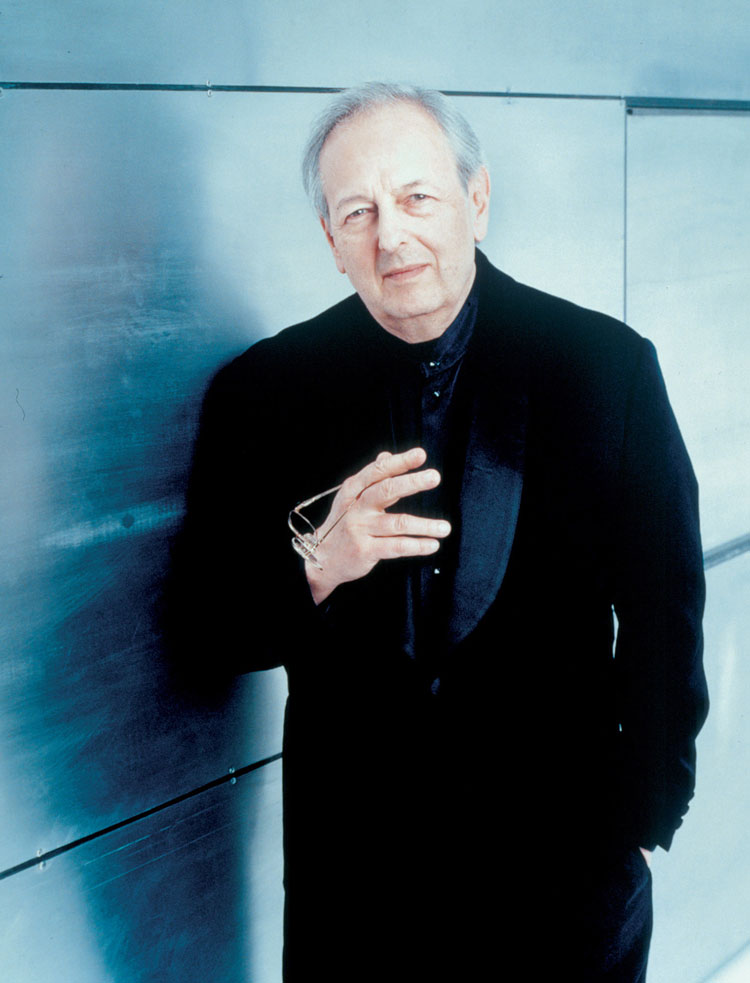
André Previn made his first ever Gramophone appearance in October 1948 at the age of 19. He had recorded a couple of Ellington/Strayhorn tunes with his jazz trio for Parlophone: 'This being his first record to be issued here, André Previn, 19-year-old German-born pianist, will be a new name to most British jazz enthusiasts. Trained in the classical tradition during his boyhood, André took to jazz when he heard a record by blind pianist Art Tatum. From then on, he worked to attain mastery of a delicate style of piano-playing that owes something to Tatum, something to Teddy Wilson and a little to Duke Ellington. Previn, who is as promising in the fields of composing and orchestrating as he is in the realms of jazz performance, is a young man with a belief in melodic jazz. By that is not meant “sweet" jazz, but jazz which combines melodic appeal with a strong beat. It is Duke Ellington whom André most admires as a jazz composer, because, as he says, "Duke never sacrifices the melodic aspect of jazz for the purely rhythmic".'
From jazzman to conductor
Previn's name became an increasingly regular presence in Gramophone through the 1950s, usually in the capacity of jazz pianist or composer/conductor of film scores. It was not until the mid-1960s that he began to transition from this extremely successful career to that of conductor of classical orchestras. It was in October 1965 that Roger Wimbush noted: 'Bernstein once recorded a lecture on jazz, and it is obviously easier for a performing artist to bridge gaps or to jump chasms in America than here. Now Previn has been conducting Vaughan Williams of all people in Houston, Texas, of all places - the Sixth Symphony to be precise, which apparently the Texans fell for in a big way. He was in London recently to record the Tchaikovsky No 2 and Shostakovich No 5 with the LSO. He lives in Hollywood and has written some 40 film scores, apart from all his work as a jazzman.'
In July 1966, Wimbush returned to the theme of Previn's career transformation, and caught up with the man himself, albeit briefly, and noted presciently: 'All in all, Mr Previn reveals something of the protean character of Leonard Bernstein, and if we put that the other way round the compliment is as genuine. When I left him he was about to drive out of London to find a house, for he is paying us the compliment of wanting to live here for half the year.'
The start of a beautiful conductor/orchestra relationship
His rise as a conductor was meteoric. In May 1968 was announced that Previn had been made principal conductor of the London Symphony Orchestra, succeeding István Kertész. In June, Roger Wimbush managed to grab five minutes with Previn once more:
'During the past two years Mr Previn, who first hit the headlines as a jazz pianist, has consolidated his position as one of the world's great conductors, yet astonishingly maintains a creative interest in theatre and film. Now, in his own words, he "has everything", a home in England and the LSO appointment, in which in a titular position he follows Richter, Elgar, Nikisch and Harty.
'When I last talked with him he was looking for a house, but never thought for a moment that to head the LSO was remotely on the cards. From that time, when he was recording Rachmaninov's Second Symphony with the orchestra, it became his favourite instrument. "I like an orchestra that will play in an extrovert way - that will make a marvellous noise", adding quickly "in a Shakespearean sense". I saw him again just after the announcement and a week before his 39th birthday, which he was going to spend alone in an aircraft returning to Texas, where he is conductor of the Houston Symphony Orchestra, and where Sir John Barbirolli has been sharing the seasons.
'Like Julius Katchen he is not very interested in what he calls the anti-music of so many contemporaries, particularly since a lifetime is not long enough to encounter, let alone to understand, the heritage that has come down to us. He had an interesting story about Houston, where it is a tradition to perform one major choral work each season. The locals felt that they would like to tackle Penderecki's St Luke Passion. Mr Previn happened to ask the orchestra's librarian when they had last given the Missa Solemnis of Beethoven. Curiously enough they had never done so. The omission will shortly be remedied. Mr Previn does in fact conduct a great deal of the contemporary music he admires. Among British composers are Sir William Walton, Sir Michael Tippett, Benjamin Britten and Richard Rodney Bennett, in spite of the glowering phalanx of subscribers in the front rows when he gave Mr Bennett's First Symphony. "It's all right really because they know they'll get the Pathetique during the season".'
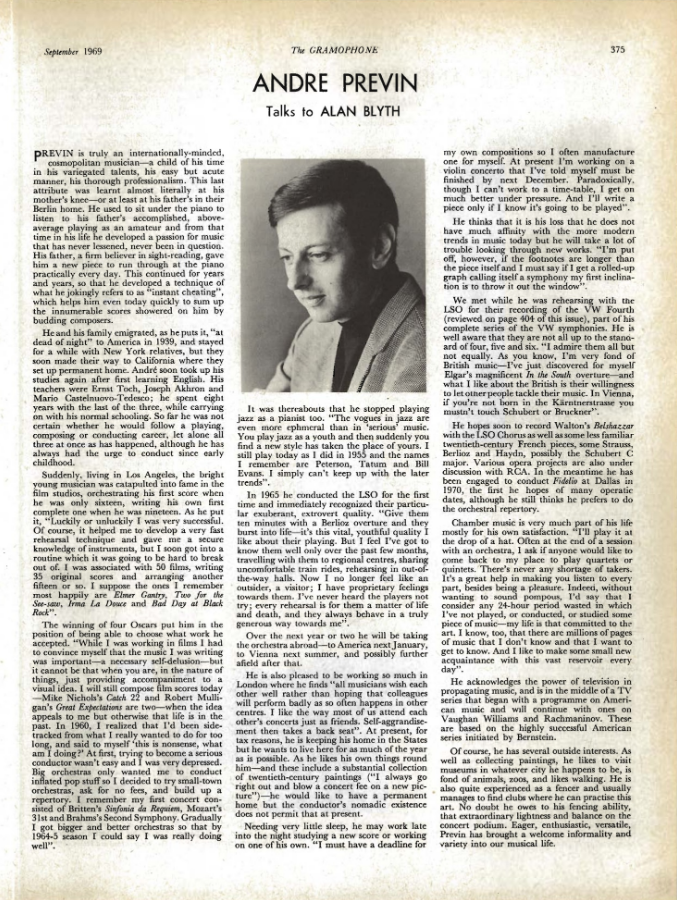
The first big interview
The following year (September 1969), Previn sat down for his first encounter with Gramophone's interviewer-in-chief, Alan Blyth:
'Previn is truly an internationally-minded, cosmopolitan musician - a child of his time in his variegated talents, his easy but acute manner, his thorough professionalism. This last attribute was learnt almost literally at his mother's knee - or at least at his father's in their Berlin home. He used to sit under the piano to listen to his father's accomplished, above-average playing as an amateur and from that time in his life he developed a passion for music that has never lessened, never been in question.
'His father, a firm believer in sight-reading, gave him a new piece to run through at the piano practically every day. This continued for years and years, so that he developed a technique of what he jokingly refers to as "instant cheating", which helps him even today quickly to sum up the innumerable scores showered on him by budding composers.
'He and his family emigrated, as he puts it , "at dead of night" to America in 1939, and stayed for a while with New York relatives, but they soon made their way to California where they set up permanent home. André soon took up his studies again after first learning English. His teachers were Ernst Toch, Joseph Akhron and Mario Castelnuovo-Tedesco; he spent eight years with the last of the three, while carrying on with his normal schooling. So far he was not certain whether he would follow a playing, composing or conducting career, let alone all three at once as has happened, although he has always had the urge to conduct since early childhood.
'Suddenly, living in Los Angeles, the bright young musician was catapulted into fame in the film studios, orchestrating his first score when he was only sixteen, writing his own first complete one when he was nineteen. As he put it, "Luckily or unluckily I was very successful. Of course, it helped me to develop a very fast rehearsal technique and gave me a secure knowledge of instruments, but I soon got into a routine which it was going to be hard to break out of. I was associated with 50 films, writing 35 original scores and arranging another fifteen or so. I suppose the ones I remember most happily are Elmer Gantry, Two for the See-saw, Irma La Douce and Bad Day at Black Rock".
'The winning of four Oscars put him in the position of being able to choose what work he accepted. "While I was working in films I had to convince myself that the music I was writing was important - a necessary self-delusion - but it cannot be that when you are, in the nature of things, just providing accompaniment to a visual idea. I will still compose film scores today - Mike Nichols's Catch 22 and Robert Mulligan's Great Expectations are two - when the idea appeals to me but otherwise that life is in the past. In 1960, I realized that I'd been side-tracked from what I really wanted to do for too long, and said to myself 'this is nonsense, what am I doing?' At first, trying to become a serious conductor wasn't easy and I was very depressed. Big orchestras only wanted me to conduct inflated pop stuff so I decided to try small-town orchestras, ask for no fees, and build up a repertory. I remember my first concert consisted of Britten's Sinfonia da Requiem, Mozart's 31st and Brahms's Second Symphony. Gradually I got bigger and better orchestras so that by 1964-5 season I could say I was really doing well".
'It was thereabouts that he stopped playing jazz as a pianist too. "The vogues in jazz are even more ephemeral than in 'serious' music. You play jazz as a youth and then suddenly you find a new style has taken the place of yours. I still play today as I did in 1955 and the names I remember are Peterson, Tatum and Bill Evans. I simply can't keep up with the later trends".
'In 1965 he conducted the LSO for the first time and immediately recognized their particular exuberant, extrovert quality. "Give them ten minutes with a Berlioz overture and they burst into life - it's this vital, youthful quality I like about their playing. But I feel I've got to know them well only over the past few months, travelling with them to regional centres, sharing uncomfortable train rides, rehearsing in out-of-the-way halls. Now I no longer feel like an outsider, a visitor; I have proprietary feelings towards them. I've never heard the players not try; every rehearsal is for them a matter of life and death, and they always behave in a truly generous way towards me."
'Over the next year or two he will be taking the orchestra abroad - to America next January, to Vienna next Summer, and possibly further afield after that.
'He is also pleased to be working so much in London where he finds "all musicians wish each other well rather than hoping that colleagues will perform badly as so often happens in other centres. I like the way most of us attend each other's concerts just as friends. Self-aggrandisement then takes a back seat". At present, for tax reasons, he is keeping his home in the States but he wants to live here for as much of the year as is possible. As he likes his own things round him – and these include a substantial collection of twentieth-century paintings ("I always go right out and blow a concert fee on a new picture") - he would like to have a permanent home but the conductor's nomadic existence does not permit that at present.
'Needing very little sleep, he may work late into the night studying a new score or working on one of his own. "I must have a deadline for my own compositions so I often manufacture one for myself. At present I'm working on a violin concerto that I've told myself must be finished by next December. Paradoxically, though I can't work to a time-table, I get on much better under pressure. And I'll write a piece only if I know it's going to be played".
'He thinks that it is his loss that he does not have much affinity with the more modern trends in music today but he will take a lot of trouble looking through new works. "I'm put off, however, if the footnotes are longer than the piece itself and I must say if I get a rolled-up graph calling itself a symphony my first inclination is to throw it out the window".
'Of course, he has several outside interests. As well as collecting paintings, he likes to visit museums in whatever city he happens to be, is fond of animals, zoos, and likes walking. He is also quite experienced as a fencer and usually manages to find clubs where he can practise this art. No doubt he owes to his fencing ability, that extraordinary lightness and balance on the concert podium. Eager, enthusiastic, versatile, Previn has brought a welcome informality and variety into our musical life.'
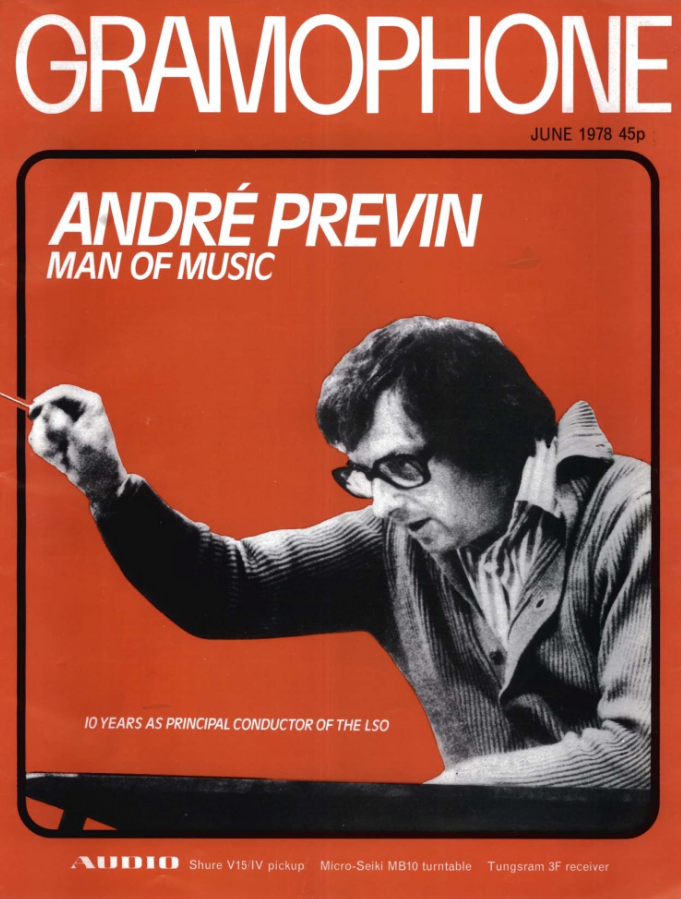
Family life in the Surrey countryside
Ten years later, in June 1978, Michael Oliver met Previn at his farmhouse in Surrey:
'The gate is wide open and seems not to have a lock at all; an abandoned tricycle rusts on the lawn; the house is decently but not extravagantly furnished and looks comfortably untidy. Previn apologizes for this on entering (he has just been giving the children their breakfast) and explains, like any other outer-suburban ratepayer, that his wife is in London, shopping, and things are a bit disorganized without her.
'If I expected our conversation to be interrupted by laconic, efficient transatlantic telephone calls ("Is that New York? I'll be on the next flight") I was disappointed; one call only, from a friend in London (the playwright Tom Stoppard, as it happens: "You can't find a babysitter either? You know, I don't think we're ever going to see that play") and a couple of determined rushes upstairs whenever an ominous noise (or an ominous silence) suggested that one of the children was up to something. He could, no doubt, spend his life in hotels and elegant service-flats, like others of his profession, but this is the life that André Previn has always wanted to live, ever since, as a student, he was drawn by a chance acquaintance with some 78rpm records of Walton's Viola Concerto into an exploration of more Walton, Elgar, Vaughan Williams, a falling in love with England and things English and an ambition to live in the English countryside and to perform the music that grew from it. If happiness is ambition fulfilled, then Previn must indeed be happy, and he shows every sign of it.
'He hopes to spend no less time in England now that he has relinquished the principal conductorship of the London Symphony Orchestra and is committed to an annual 14-week season with the Pittsburgh orchestra; he will continue to work with the LSO and with other British orchestras. Pittsburgh, though, for an American who has spent more than half of his professional life in the very differently organized world of a London orchestra, is a new experience that he is enjoying greatly. "Like most American orchestras they operate a subscription system - each concert is repeated twice - and this gives you an opportunity to programme new works or unfamiliar music that might otherwise be a box-office risk. I did a Messiaen cycle recently, for example, and although some people walked out at the first concert, the enthusiasm gradually grew as the audience got more used to this music". He has a long list of premieres ahead of him (including several works by younger English composers) and feels that the three-fold repetition of each concert is invaluable in familiarizing the orchestra with the language of a contemporary work; when they come to repeat it, after a year or so, they do not have to begin again from scratch. The same effect, presumably, applies to audiences, since he finds English music is much more readily accepted in America than American music is here. Elgar and Vaughan Williams, he says, are now repertory composers in the USA; curiously, such supposedly "unexportable" works as Vaughan Williams's Pastoral and Fifth Symphonies are more popular there than the more "international-seeming" Fourth and Sixth.
'Within reason, then, he could conduct more or less what he pleased in Pittsburgh, with its guaranteed audience, sold out in advance, expanding his own repertoire, in whatever direction he chose. Are there any works from which he still draws back, feeling himself unready for them? "There are certain pieces of which I'm in such awe that I've never been able to take them on. The St John and St Matthew Passions, for example - they're so profound and forbidding that I don't yet have the courage to approach them. I used to feel that way about the Missa Solemnis, too, but on the other hand I don't hold with the idea, which used to be so prevalent, that you have to be 50 before you do Brahms 4. Surely, only by doing it earlier and doing it wrong - no, that's a bad word - doing it with a surface sheen and nothing else can you find your way in side it. You can't really learn by just looking at it and saying 'I am not yet wise enough'."
'Studying is how Previn plans to spend a long-delayed holiday, the first for several years, that he is promising himself so me time in 1979. As well as "standard" scores awaiting reconsideration, there are new ones waiting to be read and there's a piano concerto to be written (a half-promise to Vladimir Ashkenazy). Mrs Previn's helpful, away-from-it-all suggestions ("How about a real holiday in the East Indies? Or the South Pacific?") seem destined to recede in favour of a working vacation in Surrey. "After all", he says reasonably, "My profession isn't one that anyone would want to get away from, is it?". Music is enough, then? "Life isn't nearly long enough for it". But doesn't he get tired of some music, at least, conducting it year in and year out (150 concerts this year, he estimates, conceding that it is rather too many)? "Yes; a surfeit can cause a sort of temporary shut-down in your brain - it's nothing to do with the music itself, of course - and then you don't want to hear it for a while. I conducted all the Prokofiev symphonies recently, all seven within a few days, and after that I wasn't too keen to listen to Prokofiev for a week or two. But there's rather a lot of music by other composers around, you know".
'And then he tells, with great affection, a story of being in an aircraft with Sir John Barbirolli during a particularly severe electrical storm. "Quite literally, it was so bad that none of us expected to survive. JB was wringing his hands and complaining bitterly: "'It's too awful; I haven't conducted all the Bruckner symphonies yet!'. Come to that", he adds, "neither have I".'
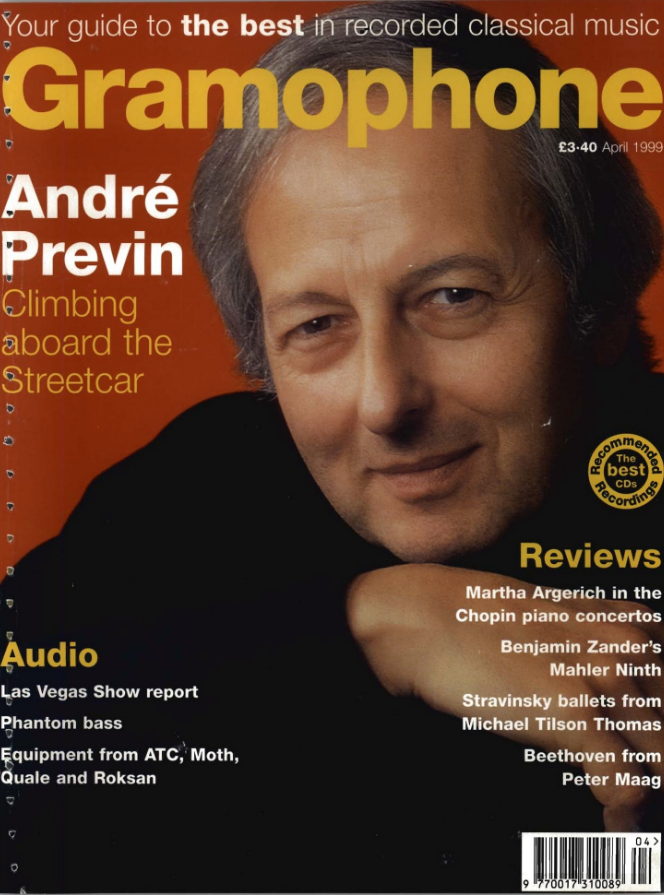
A composer of grand opera
When Matthew Gurewitsch met Previn 20 years later, in April 1999, it was to discuss the third strand of his career, after pianist and conductor, that of composer. Specifically, his first opera, A Streetcar Named Desire:
'"Dear André," the opening-night telegram read, "This better be good. Sondheim." This story comes in answer to the inquiry how it felt, on the threshold of the biblical three-score years and ten, to embark on a new career as an opera composer - and as the composer of an opera that, given the stature of play on which it is based, had to be a masterpiece if there was to be any excuse for adding music at all. "That was a real colleague's telegram."
'The opera in question is André Previn's A Streetcar Named Desire, set to Philip Littell's artful adaptation of the Tennessee Williams sex-and-booze-drenched classic. But along with the anecdote, the composer offers comment of his own. "I don't allow myself to think of how what I write will be received or perceived. Of course there was anxiety." By now, he can take reassurance from the list of future performances in a half dozen cities in the US and abroad. One of these engagements, to be announced, reunites Previn the conductor with Renée Fleming, Previn the composer's original Blanche DuBois.
'But for his American passport, it would now be Sir André, the KBE having been conferred in 1996, in recognition of his "outstanding contribution to Anglo-American cultural relations and the musical life of Britain". The knightly trinkets are on view in the living room of his flat in an East Side high-rise. The largest, a star of what looks like facet-cut industrial steel, never sees service, he says, because it ruins your coat. "In England people kid you about a knighthood," he confides, "but it's nice to get it."
'His four Oscars are not in evidence, but the apartment in New York is only one of his homes, and despite such amenities as fine porcelain, Mughal miniatures and autograph letters of Brahms, Berlioz, Elgar, Debussy, Puccini and Ravel probably not the most congenial. On the exclusive island Martha's Vineyard, off the coast of Massachusetts, he lives in a house, with views of plants and trees. The only green to be seen from his Manhattan window is the oxidized roof of a nearby church, several storeys down. "It's snowing up," Previn observes, peering past a magnificent Edison phonograph, its horn hand-painted with roses, purchased on impulse from a vendor by the side of a country road. Outside the window, city thermals play, more prettily on a winter's day like this than in dusty summer.
'His birth in Berlin as Andreas Ludwig Priwin, his boy-wonder years in Hollywood and success as a jazz pianist, his years on the podium of St Louis, Houston and especially the London Symphony Orchestra, his swelling discography, his success as television host, his excursions into popular theatre – this ancient, illustrious enough history takes up a column-plus of hard-won space in Grove. The last two decades have added music directorships in Pittsburgh and Los Angeles, longstanding symphonic associations in New York, Boston, Vienna, Berlin and Tokyo and numerous further recordings. "Somewhere," Previn asks, "please say how much I love the London Symphony. I'm very fond of working with them. We go back over 25 years: it's the personal ties as well as the music. Endless concerts, touring, recordings ... it beats anything in my life." The years have touched him lightly, silvering his flyaway hair but leaving his complexion unlined, his step quick, and a touch of the elfin in his movement. He is the easiest of artists to talk to: gentle, soft-spoken, forthcoming with his own views, inviting candour from others, and never, ever presupposing total recall of his résumé.
'His great adventure in recent years has been his love affair with vocal music. A prelude of sorts, unmentioned in Grove though it might have been, was the group Five Songs to texts of Philip Larkin, introduced by Janet Baker in 1977. Previn's particular delight, however, is the soprano voice, and the 1990s have seen a succession of pieces custom-fitted to the talents of a succession of ladies including Kathleen Battle, Sylvia McNair, Barbara Bonney, Elizabeth Futral, and above all Renée Fleming. Futral, a bright-voiced charmer, was the warm-hearted, generous Stella to Fleming's self-dramatizing Blanche in Streetcar. Lotfi Mansouri, the General Director of the San Francisco Opera, without whose persistence over the years the play might never have crossed the tracks into music, encouraged Previn to think of Stella as a mezzo, for contrast, but Previn knew his mind. 'I'm in love with the sound of two sopranos singing,' he explains. 'I never got over the Richard Strauss thing.'
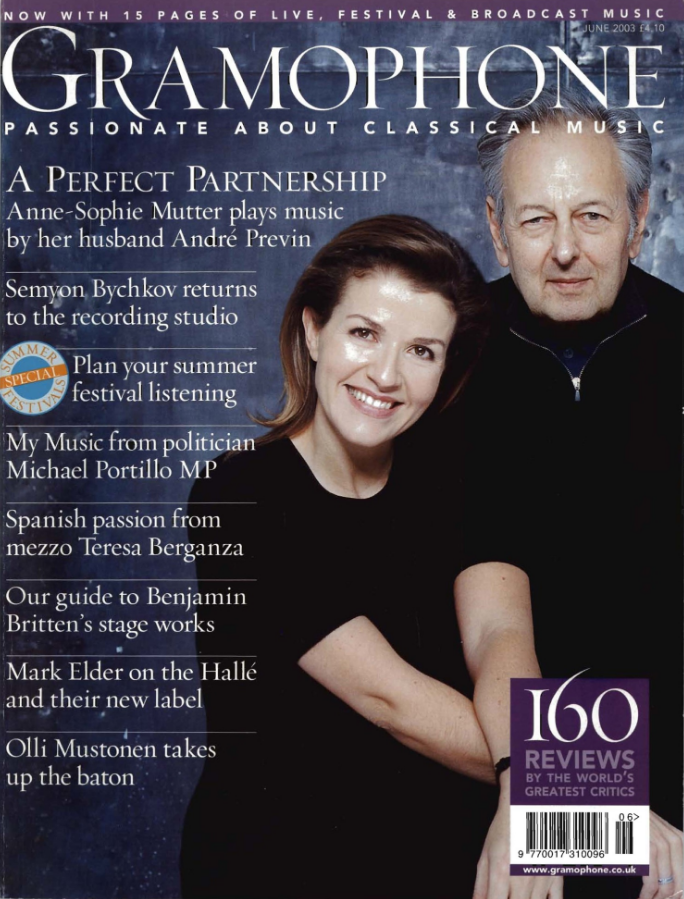
A new concerto for Anne-Sophie Mutter
In June 2003, Previn had written a new violin concerto for his new wife, Anne-Sophie Mutter, and Laurence Scherrer went to Boston to speak to them both:
'The newlyweds sit together on a large sofa, and as we begin, Previn gently places his hand on his wife's knee, where it stays for the next 45 minutes. I then remind the Previns that I am conducting this interview for Gramophone. "It's nice of you to mention it," says Previn, "because very often journalists just sit down and begin asking questions, without saying where they're from."
'"They wouldn't sit me down," says Mutter emphatically. "If I don't know that the journalist is from a serious paper I'm going to leave me room instantaneously. No joke."
'"Well," says Previn, "one time in Zurich, I was interviewed by a whole troupe of journalists, and one of them was from a magazine called The Cake Monthly. I thought it was a put on."
'The Previns can't quite remember just when or where they first collaborated, though they recall performing together in Los Angeles in the mid-1980s. Mutter firmly puts to rest any further discussion of events leading up to their marriage. 'It's nobody's business. We got married on August 1, and that's it."
Although both have made their respective homes in a number of places internationally – for one 20-year period Previn lived in the UK – their main home is now in Germany, while they keep Previn's New York apartment. "We try to be together on the road," he says. "We have a calendar containing our dates, running up to 2006. And we try very hard to do things together, or at least not to be apart for very long."
'We turn to the subject of the Violin Concerto, and I note the restraint of Previn's orchestration. "I really wrote it as a concerto for Anne-Sophie," he says. "Therefore I scored it so that you'd hear her when she's playing." "But," Mutter interjects, "it's not like Paganini, where the orchestra just sits there." "No," says her husband. "There's a lot going on orchestrally, but I was still careful not to dish up the Pines of Rome behind her." Unlike so many concertos written over the past 60 years which pit the soloist against an orchestral texture that conjures up a street brawl.'
'Mutter comments on the pleasure she derives as a violinist from Previn's strong lyrical tendencies, and she declares her preference for "music that expresses something. What good is it for a composer if you rattle yourself through the premiere of his work, and then say 'Thank God, that's over, now I can forget that garbage.'"
'"Spoken like a world-class artist," says Previn, laughing heartily. "But she's absolutely right. Whenever I've written a piece, for Anne-Sophie, or Yo-Yo, or whomever, once we've agreed on what it's going to be, they all say [whispering] 'Write me a good tune, I want to hear a big tune.' They don't dare say it out loud - well, she does. A composer friend once heard a piece that I wrote for the Vienna Philharmonic, and he said, 'God, I wish I could afford to write those big melodic episodes. But I don't have the guts. I'd be crucified.' And I said to him, 'By whom, by critics, for Christ's sake?' And he said, 'Well, yes.' I think that this all started when the critics who attended the premiere of the Rite of Spring wrote that it was nonsense. Of course, they were all proven wrong. Ever since then, if something is unrecognisable, impossible to understand, and the audience hates it, many critics automatically say that it must be good."'
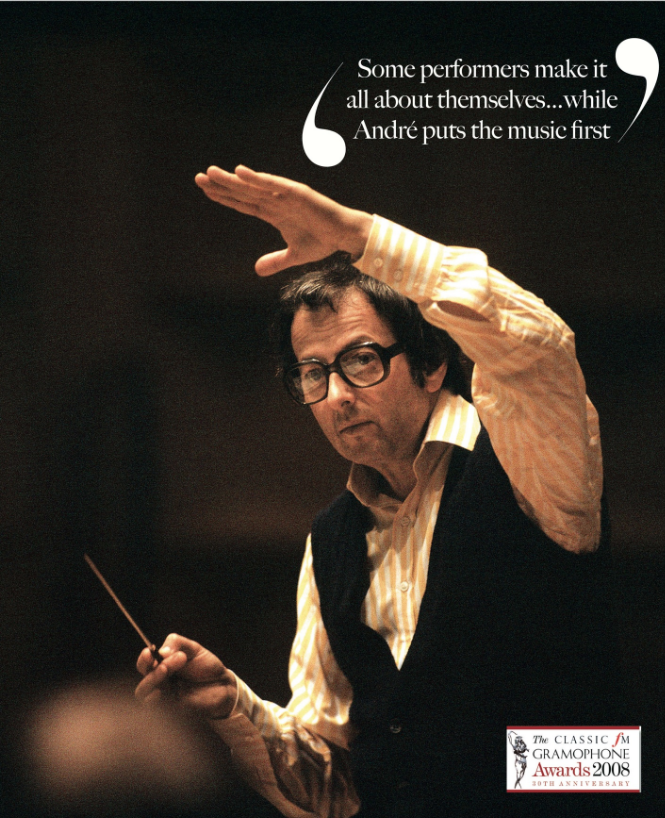
A lifetime of achievement
In 2008, André Previn won Gramophone's Lifetime Achievement Award, and the soprano Barbara Bonney paid the following tribute:
'As a longstanding member of the André Previn fan club, it has been a privilege to work with him over the past 20-odd years. We first met in Tanglewood during the fabulous Seiji years when the gang, including Yo-Yo Ma, John Williams, Itzhak Perlman and Manny Ax used to hang out and just have a blast making music together.
'How can you help but have an instant spark with André? He is one of the wittiest and most charming people on the planet. Right away there was a chamber music-style appreciation in our communication. We knew we could do wonderful work together. And after Tanglewood, we collaborated all over the world, from New York to Vienna. He composed music for me and I love singing for him. Musically, I would place him in the same field as Mozart and Richard Strauss, composers who loved the soprano voice and adored writing for it. André understands voices and the things he has written for me and for Renée Fleming are just amazing - outpourings of expression for the eternal female. His vocal writing is very complicated, difficult to learn, but it sounds effortless, direct and honest. There is something of life in that; complexity that you have somehow to translate into a direct and honest approach.
'Born in Berlin, brought up in Vienna, he has lived all over the world and done seemingly everything. He is a truly international, multi-talented guy. The way he plays piano is astonishing beyond belief. He is a magnificent conductor. A great composer. He is also one of the great raconteurs and one of the funniest people I have ever met.
'Of course the danger with someone so funny is that he'll say something just as you're about to go on stage, you'll be laughing your head off and then find that your voice doesn't work. But making music is so easy with André, it is simply an extension of your friendship. It always works, it's always fun.
'There was one great moment in 1993, when I was at the Metropolitan Opera and a call came through. André needed me in Vienna the next day to substitute for Kathleen Battle in concerts of Carmina Burana which, to add to the pressure, were being recorded. I rushed over to find that Vienna was intensely hot (this was before the Musikverein had air conditioning). By the time I was due to stand up to sing my first number, we were all sweating profusely. I was nervous and uncomfortable, and as the orchestra was retuning André leaned over and said very clearly, "Can we all go take a shower now?" With the microphone right there! Of course I started laughing but it diffused the fear factor. He makes you giggle at yourself, he stops you taking it all so seriously and then you perform better.
'If he is less revered as a conductor than some others, it is because he is not a show-off. He is self-deprecating and the thing I love about him the most is that he stands behind the music. Some other performers make it all about themselves, while André puts the music first. I have always tried to do that as well.
'That's not to say that anybody stops him being a truly great musician. The story that sums up his spirit is the one about his audition for George Szell. He turned up to play the piano for the fearsome conductor, only to find that there was no piano. Undeterred, Previn "played" the piece on a table. "Too slow," muttered Szell. Previn replied, "I'm used to tables with a quicker action." He got the job! That's Andre - he's cool and relaxed, he does his thing and if someone doesn't like it, too bad.
'He has always inspired me, with his spectacular skills at the piano, his fantastic charisma and honesty on the podium, and his ability to turn a wistful text into a powerful song. André, your talent leads the way, and your friendship has sustained many of us over the years. Laudamus te.'











